Double Indemnity (1944)
Dir. Billy Wilder
Writ. Billy Wilder, Raymond Chandler; based on James M. Cain's novel
w/ Fred MacMurray, Barbara Stanwyck, Edward G. Robinson, and Jean Heather
Trying to reconcile himself to the person he's closest to, insurance salesman Walter Neff surrendurs the truth of the events leading up to a fraudulent scam in which his lover's husband can produce a golden egg by dying accidentally on a train. The voice over narrative, ever reminiscent of the opening scene of Neff careening recklessly to get to the office, leads a suspensful and introspective domestic nightmare. As he's pulled ever deeper into Phyllis Dietrichson's machinations -- sympathizing with her dread of the abusive, alcoholic terror awaiting her at home -- he learns that all is not as it seems. Their lopsided love affair staggers between the twisted passion that arises at the prospect of ridding the world of one man and the thrill of plotting a scheme that would go all the way, no hiccups, straight down the line.
If ever a writing duo wove an unsung swan song, Raymond Chandler and Billy Wilder did when they penned this lush but terse and often powerful landmark film. [1] Although owing a lot to earlier noir-like flourishes, Double Indemnity remains an enigmatic foreshadowing of the subsequent emergence of American crime novel fixation in Europe, and film historians usually diagnose this as the first complete noir expression. [2]
All the elements of classic filmmaking, though, combine to render an intriguing and unparalleled feature that bears, as part of the ironic legacy of its title, the dual blessing and curse of reflexive history. In response to its less than immaculate reception at the Academy, Wilder sank his disappointment into his follow-up, The Lost Weekend (1945), which snagged the same majors as rival Leo McCarey for Going My Way (1944). Wilder's competitive nature probably explains most of the seeming jest of experiencing a sense of personal failure for not having made it big at the Oscars, even in light of the fact that until the 1960s, the Academy Awards were considered by more than just the Hollywood sector of the industry to be the last word in quality. Taking in the film as a whole, however, leaves a question as to what kind of director couldn't simply take pride in his work, award winner or not.
For one thing, Fred MacMurray turns in a to-the-letter performance as the salesman taking the irresistable challenge of the ultimate sale, kindling his obsession with perfection. Barbara Stanwyck, burdened with the necessity of playing off not only her co-star but the voice over, radiates an alternating little girlishness and an older woman's aloof but accessible charm. The combination's heady and alluring and wouldn't be equaled again until Mike Nichols's The Graduate (1967). But Edward G. Robinson's little man, Barton Keyes, brings a character to the screen so rich with nuance and mannerisms that his naturality as the anchor of this small insurance world oftentimes goes completely unnoticed. It's as if the sun may rise and set elsewhere, but in the black and white world of eternal noir night, the bottom line sets the bar.
To counteract that direction and to give the film a bit more breadth, perhaps, we're introduced to a fourth character, Lola, Phyllis's step-daughter. She brings back some of the daylight and a naive quality that leaves her fragile and confused, only the appropriate reaction to the world spinning out of control around her. Descriptions of sensory influences blend with Lola's simple presence in the film as a reminder of everything that the insurance business purports to protect but instead betrays.
It's so easy to be debauched by Phyllis and Walter's seductive relationship that it's even easier to forget their penchant for murder, thanks to the incredible work of cinematographer John Seitz and the chemistry between MacMurray and Stanwyck. Every gesture, every glance, charges the air around them with intrigue and excitement so compelling that even the smallest objects around them transform into conduits for those feelings. The stacks of canned goods on the grocer's rationed shelves become Aztec cities; the phone booth transcends its geography to suggest howling winds that must be hushed into reverence; and honeysuckle smells famously like murder.
The most awing and humbling act arrives when, having been caught up in the dirty business of covering up their crimes, Neff does his best to make things right. He may be a little late, but after all the madcap racing around, his effort speaks quietly of a man who recalls that life offers more than the option between the grind or a heist. Partly due to Lola but mainly because no man likes to be tricked by someone he cares about, the film's finale reverberates with the simple reminder of things that all of us need to be able to count on but can take for granted way too much. Even those not easily succumbing to the thoughtless whispers of a dark and dreary night in nowhere.
Writ. Billy Wilder, Raymond Chandler; based on James M. Cain's novel
w/ Fred MacMurray, Barbara Stanwyck, Edward G. Robinson, and Jean Heather
Trying to reconcile himself to the person he's closest to, insurance salesman Walter Neff surrendurs the truth of the events leading up to a fraudulent scam in which his lover's husband can produce a golden egg by dying accidentally on a train. The voice over narrative, ever reminiscent of the opening scene of Neff careening recklessly to get to the office, leads a suspensful and introspective domestic nightmare. As he's pulled ever deeper into Phyllis Dietrichson's machinations -- sympathizing with her dread of the abusive, alcoholic terror awaiting her at home -- he learns that all is not as it seems. Their lopsided love affair staggers between the twisted passion that arises at the prospect of ridding the world of one man and the thrill of plotting a scheme that would go all the way, no hiccups, straight down the line.
If ever a writing duo wove an unsung swan song, Raymond Chandler and Billy Wilder did when they penned this lush but terse and often powerful landmark film. [1] Although owing a lot to earlier noir-like flourishes, Double Indemnity remains an enigmatic foreshadowing of the subsequent emergence of American crime novel fixation in Europe, and film historians usually diagnose this as the first complete noir expression. [2]
All the elements of classic filmmaking, though, combine to render an intriguing and unparalleled feature that bears, as part of the ironic legacy of its title, the dual blessing and curse of reflexive history. In response to its less than immaculate reception at the Academy, Wilder sank his disappointment into his follow-up, The Lost Weekend (1945), which snagged the same majors as rival Leo McCarey for Going My Way (1944). Wilder's competitive nature probably explains most of the seeming jest of experiencing a sense of personal failure for not having made it big at the Oscars, even in light of the fact that until the 1960s, the Academy Awards were considered by more than just the Hollywood sector of the industry to be the last word in quality. Taking in the film as a whole, however, leaves a question as to what kind of director couldn't simply take pride in his work, award winner or not.
For one thing, Fred MacMurray turns in a to-the-letter performance as the salesman taking the irresistable challenge of the ultimate sale, kindling his obsession with perfection. Barbara Stanwyck, burdened with the necessity of playing off not only her co-star but the voice over, radiates an alternating little girlishness and an older woman's aloof but accessible charm. The combination's heady and alluring and wouldn't be equaled again until Mike Nichols's The Graduate (1967). But Edward G. Robinson's little man, Barton Keyes, brings a character to the screen so rich with nuance and mannerisms that his naturality as the anchor of this small insurance world oftentimes goes completely unnoticed. It's as if the sun may rise and set elsewhere, but in the black and white world of eternal noir night, the bottom line sets the bar.
To counteract that direction and to give the film a bit more breadth, perhaps, we're introduced to a fourth character, Lola, Phyllis's step-daughter. She brings back some of the daylight and a naive quality that leaves her fragile and confused, only the appropriate reaction to the world spinning out of control around her. Descriptions of sensory influences blend with Lola's simple presence in the film as a reminder of everything that the insurance business purports to protect but instead betrays.
It's so easy to be debauched by Phyllis and Walter's seductive relationship that it's even easier to forget their penchant for murder, thanks to the incredible work of cinematographer John Seitz and the chemistry between MacMurray and Stanwyck. Every gesture, every glance, charges the air around them with intrigue and excitement so compelling that even the smallest objects around them transform into conduits for those feelings. The stacks of canned goods on the grocer's rationed shelves become Aztec cities; the phone booth transcends its geography to suggest howling winds that must be hushed into reverence; and honeysuckle smells famously like murder.
The most awing and humbling act arrives when, having been caught up in the dirty business of covering up their crimes, Neff does his best to make things right. He may be a little late, but after all the madcap racing around, his effort speaks quietly of a man who recalls that life offers more than the option between the grind or a heist. Partly due to Lola but mainly because no man likes to be tricked by someone he cares about, the film's finale reverberates with the simple reminder of things that all of us need to be able to count on but can take for granted way too much. Even those not easily succumbing to the thoughtless whispers of a dark and dreary night in nowhere.
[1] Crime novelist Raymond Chandler wrote the screenplay for Alfred Hitchcock's Strangers on a Train (1951) in addition to whipping up the dialogue with Wilder from Cain's novel, which was originally entitled Double Indemnity in Three of a Kind. If titles are any indication whatsoever of writing abilities, suffice to say it's a good bet that the film's substantially better.
[2] A year too late to make the grade, Edgar G. Ulmer's Detour (1945) struck a similar note as a classic that would be all but forgotten upon release, only to be dug up by film historians who, presumably, preferred the indie director to Wilder.
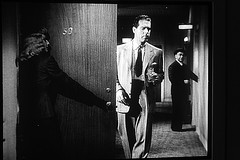


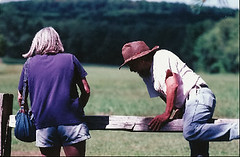
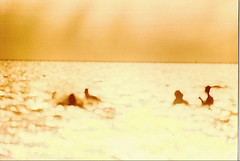

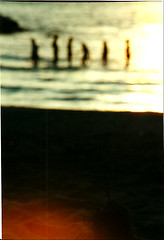

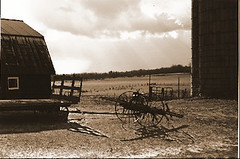
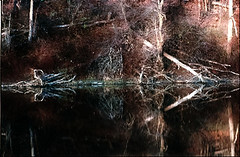






0 Comments:
Post a Comment
<< Home